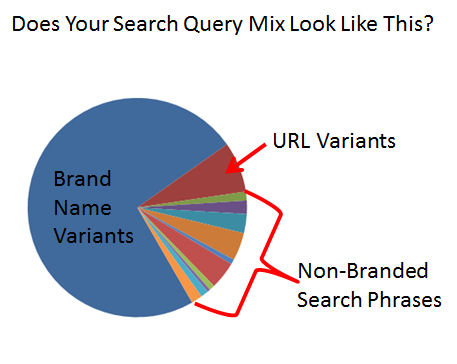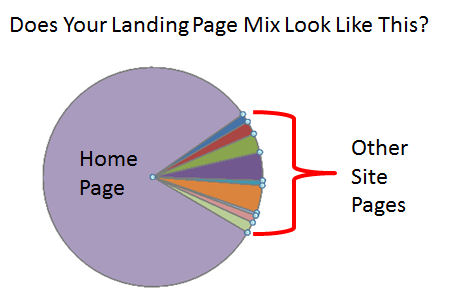SEO Opportunities Begin Well Before New Website Development
Launching a new site, or any major site update, for a large enterprise comes with some unique challenges. A short summary of some of the most common include those listed below. SEO Challenges: New Site Launch Or Major Updates Too many decision makers. This is one of the more basic headaches. Product marketing, engineering, PR […]
Launching a new site, or any major site update, for a large enterprise comes with some unique challenges. A short summary of some of the most common include those listed below.
SEO Challenges: New Site Launch Or Major Updates
- Too many decision makers. This is one of the more basic headaches. Product marketing, engineering, PR and the executive branch can all weigh-in in ways that can have you ripping your hair out.
- Many development priorities. This is often the most frustrating challenge, because it is the hardest one to combat. Other priorities may well be more important in the short term than what you are pushing for. Or, worse, it just makes it harder for you to get key players to buy into your idealistic view of the best way to build the new website.
- Ignorance of SEO. You still run into those that think that SEO is unimportant. Yes, they are still out there. I dug into this a bit in my article, Why Do Brands Overlook the SEO Opportunity for Non-Branded Keywords?
- Misinformation About SEO. This one is worse. The exec who thinks they know something, but the information is wrong, just might drive you mad. Just last week at SMX West, I was talking to one exec that told me they had just finished updating the meta keywords on 1800 to their pages. To them, this was SEO. The lost time is certainly one bad part of this, but worse still, to this exec, the SEO for the site was done. (I took it upon myself to set them straight.)
- Misconceptions. The belief that SEO is Hopeless.
The above misinformation deserves its own brief discussion. Many believe that Google changes the rules at its whim, and hence, no SEO effort is sustainable. They have not yet bought into the basic concept that modern SEO is not about tricking Google; it is, in fact, a form of branding activity that uses many tactics that support the overall brand in ways well beyond pure ranking in the SERPs.
There are many other types of problems, but you notice that none in my above list have anything to do with the actual execution of the new website project. Let me hit you now with the stunning conclusion: the real opportunity for you occurs long before the project planning starts.
Ideally, it starts months before. That is the timeframe in which the game will be won or lost. You want to get out in front of this before the people involved begin to generate any level of activity on the project at all. If you know that the plan is to begin working on a new site in July of 2013 (or even October of 2013), the time to begin doing your work is now.
Getting the best result depends on educating the people involved, and getting their incentives aligned properly. (You can read some thoughts on how to help with the education process in my articles: Selling the Benefits of SEO in a Large Enterprise, and Getting Top Management Buy-in for Enterprise SEO).
In addition to what you see in those two articles, below are two more ideas about speeding up the education process.
Show Them Examples Of Failure
I wrote about one example of this in my last Enterprise SEO column. If you search on the generic term [diapers], Pampers and Huggies are not part of the first 6 organic SERPs:
As you can see, Pampers and Huggies are far and away the biggest brands in this space but do not rank prominently. The same thing happens if you search on another generic term such as [aspirin]:
This happens with major brands for all kinds of generic search queries. In addition, if you dig into it hard enough, you can find interesting case studies such as this one Bryson Meunier wrote about on a Mobile SEO audit. Launching a new mobile site? You can use this article to talk the team out of using a transcoding approach.
Use Your Own Analytics
Your execs might point out that you are getting lots of traffic to your site. However, traffic is not the same as organic traffic on relevant non-branded keywords. The purpose of SEO is to get you traffic on these types of keywords, anyway.
As a first step, use analytics to show them what percentage of that traffic is organic. Then you can dig into it a little further to show them the search query mix. Hopefully, it does not look like this:
If it does, you are not doing well in your SEO! Your non-branded search query volume should dwarf your branded volume. Another way to get a look at this same problem is to look at the landing page mix. It is not good news if it looks like this:
Takeaways For SEO Project Planning
The key is to realize that you need to get way out in front of this. By the time people are trying to schedule the project planning meeting, it is way too late to make major changes in the way they perceive SEO, or perceive the priority of SEO.
Changing this type of mindset is something that takes many months, and lots of data. No matter how you start the exercise, and no matter how good you are as a teacher, different people get stuck in different places, or will raise different objections.
You need time to find out what these objections are, and then you will have to find ways to address them. When you are done with the first objection, you will run into the second one, and the process will repeat itself again. In addition, you are likely to have only limited time slots in a given month.
For example, if you get to meet with the development VP next Monday, you may get 10 minutes to insert a bit of your thoughts on SEO. That may be the only time you get with her/him until next month. If you have several objections to work through, it can take many months. Plan on this and work the process long before that new website project ever hits the drawing board.
The further out in front you can get started, the better. And, be prepared to exercise lots of patience!
Contributing authors are invited to create content for Search Engine Land and are chosen for their expertise and contribution to the search community. Our contributors work under the oversight of the editorial staff and contributions are checked for quality and relevance to our readers. The opinions they express are their own.
Related stories
New on Search Engine Land



